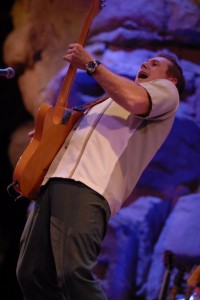For those readers too young to recall firsthand, the following account of recent music history will sound as improbable as the prospect of Lindsay Lohan being appointed attorney general of the United States. But there was a significant – albeit brief – moment during the 1980s when the contrasting civilizations of guitar-driven blues and pop-culture converged to form one extremely cool alliance. Artists like Stevie Ray Vaughan, George Thorogood, and Robert Cray were not only sitting comfortably within Billboard’s Top 10 charts, but their music videos were in heavy rotation on MTV, the era’s highest symbol of achievement. Generation Xers across the nation did their homework to the flickering images of the latest Fabulous Thunderbirds and Stray Cats videos. Ahh, it was a glorious time …
 And out of that burgeoning blues renaissance came a newly energized throng of live club bands capitalizing on the sound at a pace not seen since Liverpool 1964, and arguably not equaled till Seattle a decade later. Though most agree that Austin, Texas, was and continues to be ground zero for the rhythm and blues scene, Rhode Island has certainly produced its fair share of authentic roots-rock and blues acts. However, one act has consistently stood out from the pack in terms of authenticity, energy, notorious live shows, and unyielding staying-power – Neal and The Vipers. Led by the irrepressible guitarist “Young” Neal Vitullo and frontman singer/harp player extraordinaire Dave Howard, the story of Neal and The Vipers is rife with all the touchstones of a thriving rock and roll band. Having survived decades of personnel changes, ill-fated major record label dealings, and all the obligatory demons that come with sudden and sustained success, The Vipers have always followed a deceivingly simple formula. They write well-crafted and lyrically engaging songs, performed with an urgency that grabs anyone in earshot by the proverbial lapels, demanding their undivided attention. Although not a suitable substitute for experiencing a Neal and The Vipers gig first-hand, their latest offering, e, captures one such rock and blues spectacle (recorded live at Chan’s) in all its attention-demanding glory. The disc kicks off with the dark, hard-driving original “One Horse Town,” lyrically replete with imagery of southern roads, nipping hell-hounds, boxcars, and Yankee strangers heading into unfriendly territory. It’s complete with classic Dave Howard songwriting – “Her daddy warned me on the first day he met me, and he warned his pretty little daughter, too … a man fit for hanging won’t be hanging around with you.”
And out of that burgeoning blues renaissance came a newly energized throng of live club bands capitalizing on the sound at a pace not seen since Liverpool 1964, and arguably not equaled till Seattle a decade later. Though most agree that Austin, Texas, was and continues to be ground zero for the rhythm and blues scene, Rhode Island has certainly produced its fair share of authentic roots-rock and blues acts. However, one act has consistently stood out from the pack in terms of authenticity, energy, notorious live shows, and unyielding staying-power – Neal and The Vipers. Led by the irrepressible guitarist “Young” Neal Vitullo and frontman singer/harp player extraordinaire Dave Howard, the story of Neal and The Vipers is rife with all the touchstones of a thriving rock and roll band. Having survived decades of personnel changes, ill-fated major record label dealings, and all the obligatory demons that come with sudden and sustained success, The Vipers have always followed a deceivingly simple formula. They write well-crafted and lyrically engaging songs, performed with an urgency that grabs anyone in earshot by the proverbial lapels, demanding their undivided attention. Although not a suitable substitute for experiencing a Neal and The Vipers gig first-hand, their latest offering, e, captures one such rock and blues spectacle (recorded live at Chan’s) in all its attention-demanding glory. The disc kicks off with the dark, hard-driving original “One Horse Town,” lyrically replete with imagery of southern roads, nipping hell-hounds, boxcars, and Yankee strangers heading into unfriendly territory. It’s complete with classic Dave Howard songwriting – “Her daddy warned me on the first day he met me, and he warned his pretty little daughter, too … a man fit for hanging won’t be hanging around with you.”
“Little Miss Prissy,” another Howard-Vitullo classic, was originally released on the band’s debut CD, Hooloovoo, in 1991. Though it appeared on a previous live Vipers album sans Howard, this time Dave is firmly back in the driver’s seat. His sometimes gruff, yet always melodic approach to singing is most certainly unparalleled and I dare say unrivaled. Equally unique, but no less impressive, is the band’s rhythm section of drummer Mike LaBelle (who I’m on record for asserting IS New England’s answer to John Bonham) and musical journeyman Steve Bigelow on bass. That said, the true bread and butter of The Vipers has been and always will be the guitar playing of Neal Vitullo. And on the album’s instrumentals “San-Ho-Zay” and the perennial surf classic “Pipeline,” his musicianship is on display in spades. If some guitarists make love to their instruments, Vitullo takes it out and slaps it around like a Ritalin-charged 10-year-old putting his favorite new toy through its paces on Christmas morning. Though never bellicose, Neal’s approach is unapologetically bombastic and always exhilarating to witness. With Full Circle, Neal and The Vipers prove that even 20-something years into the rock and roll journey, a band can mature without ever losing a drop of its initial vitality. Any young band with aspirations toward longevity, no matter the genre, should definitely put this one on its mandatory summer listening list.
Music